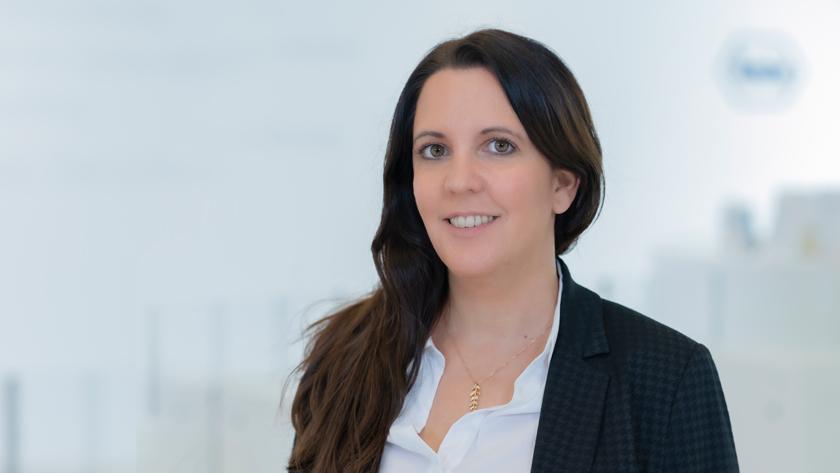IWD: Aline Gégout on women in STEM

To mark International Women’s Day 2023, we caught up with Dr Aline Gégout, global head of operations and quality at Roche Diabetes Care, to find out more about what it takes to become a leader in life sciences, and how we can encourage more young girls and women to pursue a career in STEM.
What has your career path been? How did you get into life sciences?
I grew up in a small village in the East of France with two sisters. Whereas my sisters loved to play with dolls, I was fond of playing with Lego and discovering the surroundings. One of my dreams was to get a "chemistry box", a set allowing you to perform experiments at home. I remember hoping to get this box on one of my birthdays, but I was very disappointed when my cousin got it, and I got yet another doll instead.
As someone who does not give up easily, I chose to pursue an academic path and become a doctor in organic chemistry. That gave me plenty of opportunities to work in a real lab environment. I then moved to Munich, Germany, for a two-year postdoc in epigenetics. I was interested in gaining industry experience, so I joined Roche as a leader of a chemical production site in Penzberg, Germany, in 2009. This was my first leadership role and in a very male-dominated environment. I quickly realised that being a leader can be really challenging and rewarding at the same time. I loved to see my team develop and bring the best results for the interest of our customers and patients.
Afterwards, I moved to different positions with increasing responsibilities: matrix leader in a global environment for Operations for three years; four years as head of quality control in a diagnostics business area in Switzerland. I then took over the entire operations (manufacturing, planning, engineering, quality control) for that area. For the last one-and-a-half years, I have been leading Global Operations and Quality in Diabetes Care, responsible for more than 1,500 people worldwide. At each of these steps, I knew I had to move out of my comfort zone, and I learned a lot. I sometimes made mistakes, but those enabled me to grow further and become a better leader.
What is your personal mission statement? What values keep you centred in your work?
I use a hashtag in my signature at work: #developing.building.together, which I find powerful to raise awareness about what is important to me so we can all be successful and make an impact for people with diabetes.
Developing refers to two different dimensions: as a leader, I have the responsibility to support the development of people in the area where they can use their strengths and give their best and become great talents. Investing in the potential of our people is one of my priorities. Behind the word developing is also the notion of “creating and designing” new solutions for our patients.
Building stands for “manufacturing, producing, assembling”, which relates to the last 14 years of my career and the mission I have together with my team to deliver our products to our customers on time, quantity, and quality. And we will only be successful if we collaborate and work together as a team. Through effective internal collaboration and by working together with partners, we can achieve better outcomes for patients at a faster pace.
What is your proudest professional accomplishment to date and what did you learn from it?
The accomplishment I am the proudest of is how we adapted and secured delivery during the COVID-19 pandemic. It was a very challenging situation. The demand was increasing in parallel to major disruptions in our end-to-end logistics, both at the materials' sourcing and at the transport side. At the same time, the majority of people across the organisation (and the world) were moving to home-based work, but for us, it was more important than ever to continue our operations.
We activated our business continuity plan, and we developed in record time a brand-new safety model within the entire manufacturing. It was important to minimise the risk of COVID infections between employees and to make sure our team could come to work feeling safe. To serve the increasing demand, we asked people from other teams, like R&D, people and culture, strategy, and finance, to volunteer to support the production. It was amazing to see many colleagues raise their hands, leaving the home office to work at the manufacturing site!
As the leader of the organisation, I learned a lot during this challenging situation. On the one hand, the relevance of being present with the team, whatever the circumstances are. On the other hand, the importance of continuing to build trust also in complicated situations, taking the time not only to work on the operational side of things, but also on the personal aspects, listening and answering people's needs, and putting people first.
Why is it important to encourage girls and young women to pursue life sciences roles?
In every field, representation matters, and diversity is key to decreasing any bias in our environment. Currently, women are a small part of the life sciences workforce. By encouraging girls and young women to pursue life sciences roles, we will foster a more inclusive environment with the generation of different ideas, new perspectives, and innovative solutions. Having more women in the industry could also help have a better representation of women's health all along the way, from research to the final solutions, and this could also lead to better health outcomes.
We also witness shortages of talent in the life sciences industry that can't be addressed if we don't expand the participation of underrepresented groups. Finally, more women in life sciences lead to more role models for future generations, and this can create a virtuous circle.
What advice would you give to girls or young women who are contemplating a career in life sciences?
My advice would be: "Pursue your dreams, whatever they are!" Like I did, listen to yourself, be curious, self-confident, and dare to go out of your comfort zone. Young women should also seek people to support their career path, either with a mentor at work and/or friends, family, or partners in their private life.
When I look at my 11- and 14-year-old nieces, and I see how fearless they both are at trying new things and removing first roadblocks to achieve what they want, I am highly confident that things are changing and the new "girls" generation is better equipped to follow their own path.
How important is it to have role models for young women working in the sector? Who has helped to inspire and shape your career?
It is essential to have role models in the sector to encourage more young women to pursue their careers and achieve their own goals. A role model is a great source of inspiration and a demonstration that it is possible to follow your dreams. They can challenge and bring different perspectives to career paths in life sciences. Young women can learn a lot from experienced role models, and also from mistakes they may have made. The more role models we have in life sciences, the more young women can be inspired to start or pursue the same career and ultimately the more diverse and innovative our solutions will become.
I was fortunate to always have been surrounded by great leaders supporting me in my career. I don't have one specific person I could identify as a role model, but different leaders who, during my professional journey, trusted me and understood the importance of diversity in organisations.
What can the pharma/ life sciences/med tech industry do to encourage more women to take up a career in the sciences?
There are many things that can be done. It starts at school, where industry can showcase for young girls and boys what it means to work in science and how fun and rewarding it can be. Establishing and making role models more visible for girls and young women will encourage them to pursue a career in science. I also do believe that it will influence parents to listen more to the aspirations of their children, supporting little girls in their interest in STEM activities.
Four years ago, I participated in a programme called "one day as a female leader" in the canton of Switzerland where I work. A group of young girls could follow me for one day, asking questions about my job and my career path. This was a really rewarding day for me and the girls as I could really feel the interest, they had in what we do. At the same time, they were really excited to hear about my story and realise that such a career is not impossible to achieve.
The pharma/life sciences/med tech industry can also emphasise a working environment allowing good work-life balance practices for women and men. Moreover, the industry should support different development programmes for young women, create mentorship, coaching, and networking opportunities right at the beginning of their career to support them to grow inside the industry.
Last but not least, it starts with all of us working in the life sciences industry, where we have to encourage and empower girls and women around us to follow their career aspirations! We can all be role models!
What are the most important professional skills in your work and how do you hone them?
Leadership skills are crucial. And these cover many aspects: from coaching and mentoring to listening, connecting, and developing. And including, of course, communicating.
There are many possibilities to hone them, and it is often a question of prioritisation. I truly believe that, aside from ensuring our business is running, it is important to invest time into our own development to improve. This is why I participate in different development programmes. I also like reading books and listening to different podcasts during my free time or when I commute on business trips.
Feedback is also a powerful tool. I encourage my team members to give me direct feedback, as well as my peers, leaders, and stakeholders. Through multiple feedback, we can assess where we stand and recognise our blind spots. I really strive to become a better leader every day, as the better I will develop as a leader, the better I can support the organisation to perform and the better the outcome will be for people with diabetes.
What do you think the pharma and med tech industry will look like in 15 years?
With med tech becoming increasingly present in healthcare, like in the diabetes industry, we can already witness a shift from traditional therapeutic frameworks towards more digitised, accessible, and sustainable approaches. In 15 years, I envision global access to care and long-term sustainability for patients worldwide, enabled by the integration of innovative technologies into existing medical frameworks.
Healthcare ecosystems will be more open and connected, allowing real-time therapy monitoring by patients and their healthcare professionals, as well as better tailored and personalised solutions based on data insights. Furthermore, looking, for example, at under-resourced countries and the worrying rise in numbers of people with diabetes, the interplay of pharma and med tech also becomes increasingly important and beneficial as a means to support the creation and development of sustainable care structures.
Last, but not least, we are witnessing fast progress in key fields such as data management and artificial intelligence, which will help enable this vision of connected and sustainable care in the future.
About the author
 Dr Aline Gégout is global head of operations and quality diabetes care at Roche. After starting with the company in 2009, she has held multiple leadership positions, including leader of a chemical production site, matrix leader in a global environment for operations, and as head of quality control in a diagnostics business area before accepting her current role in 2021.
Dr Aline Gégout is global head of operations and quality diabetes care at Roche. After starting with the company in 2009, she has held multiple leadership positions, including leader of a chemical production site, matrix leader in a global environment for operations, and as head of quality control in a diagnostics business area before accepting her current role in 2021.













